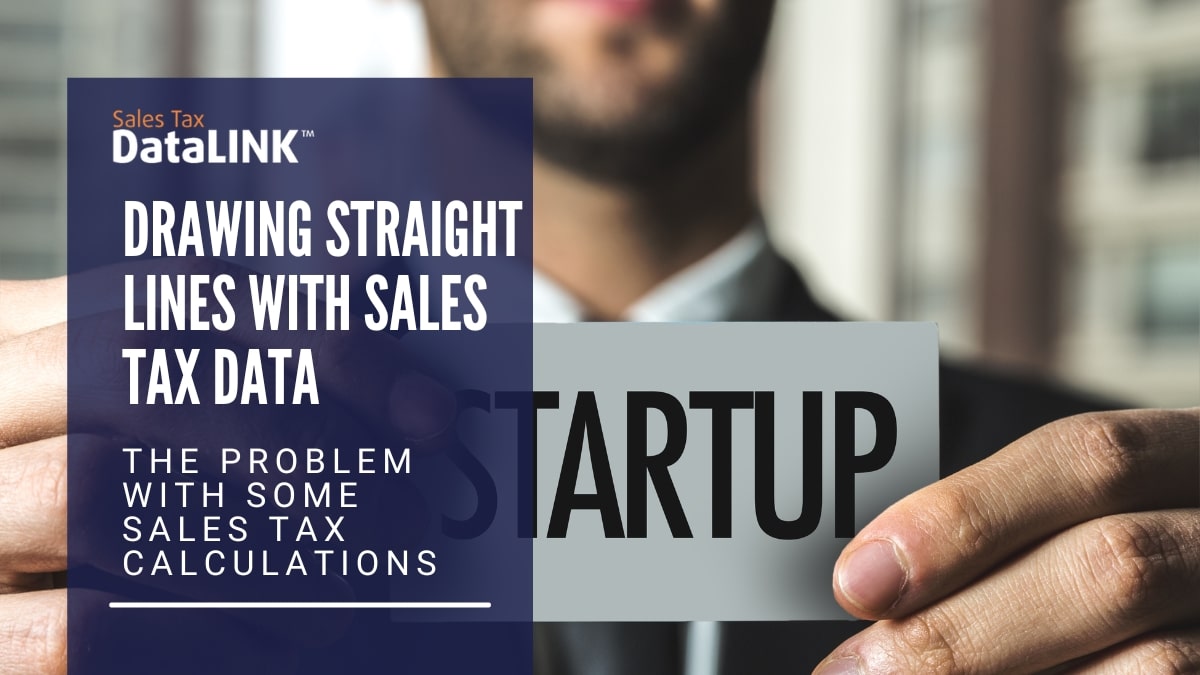Finding the right sales tax software isn’t an easy task. There are many of options for taxpayers because there are so many different ERPs, Shopping Carts, and Accounting solutions. But there’s one question you absolutely must ask before deciding to sign on with a sales tax solution provider.
How do you use geographic data to find the right tax rate?
Most businesses, when shopping around for the right sales tax software, ask questions about ease of use, integrations, and expected accuracy. But all of these questions are rooted in the same thing: how the sales tax software actually works.
Drawing Lines with Too Few Dots
Here’s an experiment to explain why it’s important to ask this question. Draw two dots on a piece of paper and draw a line between them without using a ruler to guide you. It’s bound to not be perfect. Instead, if you add lots of dots close together to guide you as you draw the line, it’s going to be a clearer, straight line.
The same goes for sales tax calculations. The more data you have to calculate sales tax, the more accurate the calculation will be.
Over the time we’ve been helping clients with sales tax filing and self-auditing, we’ve discovered that certain sales tax software products have a higher failure rate than others. Some software just does not have as many dots to increase accuracy. On average, we see between 4% and 7% errors for many sales tax calculation solutions – Why?
The problem is that software tax engines are designed to calculate sales tax—no matter what. If there an address is bad, like one that contains bad data or missing data and isn’t just simply misspelled, calculation rules activate. The coding looks for anything valid and applies a tax, right or wrong. Sales tax engines are guessing.
The Problem With Some Sales Tax Calculations
For example, you have an online customer in Kansas City, Kansas. The customer enters their order and keys in bad data, such as inputting the city name as “Kansas City 66109.” This address will cause tax engine address logic to fail and guessing rules will activate. This also means that the zip code and city name field has errors. So, taxes will be calculated using the street address and state, which means there are fewer dots in the line, reducing the accuracy of the calculation.
We’ve mentioned before that calculating sales tax solely off of zip codes is a terrible idea. Take the same transaction as above. In zip code 66109, there are over a dozen special tax jurisdictions with different rates. Using only a zip code could result in 11 incorrect tax calculations.
The postal codes were never designed to correspond with taxation but only for mail delivery. It’s the same case for another kind of code that’s a popular choice among sales tax software creators, called the FIPS code.
These FIPS codes have not been updated since 2009, so new information created since 2009, like zip codes/cities, annexations, city alias, new incorporations, and so on, have been fabricated by each software provider. On top of that, some are still using old and inaccurate FIPS codes for jurisdictions that do not exist.
Another similar type of code often used by sales tax software called a GeoCode, was also not created for sales tax purposes. They don’t always correspond to tax jurisdiction because they are anchored to a ZIP+4. A ZIP+4 in a highly populated area can cross tax jurisdictional lines since they weren’t created for sales tax purposes. For example, a building in New York can have two different tax rates but one mailing address.
When you’re shopping for sales tax software, be sure to ask the software company about the methods and rules their software uses for calculating sales tax. There is no solution that can guarantee 100% money-back accuracy, but choosing a software solution that connects more dots is often the better choice.
How accurate is your sales tax software? We offer the only patented software that can connect the dots and validate the accuracy of any sales tax software. Curious how? We can show you an exact analysis using your data within 10 minutes.




